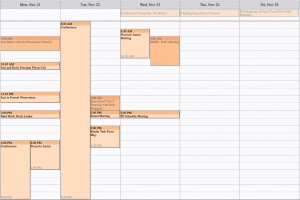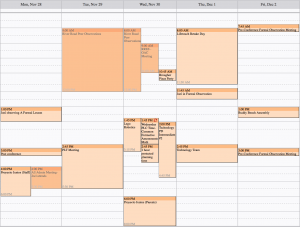Week of November 21
Hi Shining Stars,
Hope you all were able to rest up over the weekend before our short but busy week of conferences.
Reminders and Announcements:
- Family – Teacher Conferences: As everyone dives into conferences with your families please remember a few of these principles from the book on trauma informed practices published by Washington State Dept. of Education: The Heart of Learning and Teaching: Compassion, Resiliency, and Academic Success, 2011.
-
Always Empower, Never Disempower: Avoid battles for power with students and families. Students who have experienced trauma often seek to control their environment to protect themselves, and their behavior will generally deteriorate when they feel more helpless. Classroom discipline is necessary, but should be done in a way that is respectful, consistent, and non-violent.
-
Provide Unconditional Positive Regard: As consistently caring adults, school staff have the opportunity to help students build trust and form relationships. For example, if a student tells you, “I hate you. You’re mean,” respond with unconditional positive regard by saying “I’m sorry you feel that way. I care about you and hope you’ll get your work done.”
-
Maintain High Expectations: Set and enforce limits in a consistent way. Maintain the same high expectations of a student who has experienced trauma as you do for his/her peers.
-
Check Assumptions, Observe, and Question: Trauma can affect any student and can manifest in many different ways. Realize when you are making assumptions, and instead, talk with the student and ask questions. Make observations about the student’s behaviors and be fully engaged in listening to his/her response. Support the family and listen more than explain things to them.
-
Be a Relationship Coach: Help students from preschool through high school develop social skills and support positive relationships between children and their caregivers.
-
Provide Guided Opportunities for Helpful Participation: Model, foster, and support ongoing peer “helping” interactions (e.g., peer tutoring, support groups).
- Resources for Undocumented Families – Please read over these links and use them with families you know are effected by potential ICE raids and the potential fear of such incidents.
Concrete Suggestions in Preparation for January
Northwest Immigrant Rights Project – Community Advisory – 11/10/16 Advisory Regarding DACA Program After Presidential Election
Tarea Time Fall 2016 (homework help)
UO IME Becas Scolarship Application 2016-2017 (DOC file)
UO LATINX Faculty, Staff and Allies
Also, Educators for Fair Consideration (E4FC) is an organization dedicated to supporting undocumented students. Many of us are connected to undocumented students and people with mixed status families. Many people are seeking information right now in anticipation of federal changes, and important recommendations are provided below. Please share the information below with those who may benefit and keep checking this webpage for updates.
And here’s one more from Brianna Stiller that was sent out to principals and PBIS Coordinators from Chris Borgmeier at Portland State University on Addressing Harassment and Bullying in Schools.
- Title IIA Peer Observations Coming Up: Each teacher in our building has been allocated sub days (best in half days) to self examine and improve his/her practice. The PLT team confirmed that we should use these funds for continuing the practice of peer observation. Our first round of peer observations will occur right after conferences. Tuesday, November 29 will be our k/1 peer observation session. Wednesday, November 30 will be our second session for 2/3.
This is a collaboration to support of inquiry-based learning. Our focus will be on understanding language acquisition strategies for emerging bilinguals regardless of the language. We will be looking for and learning about the differences between scaffolding and sheltering strategies in the classroom. There will be time for reflection for each group to reflect on their practices and share learning with each other. Reid Sheppard and I will do this work with the teams much like last year. The subs will be used for allowing for peer observation within each grade. Myka will pre-arrange these Title 2A substitutes for us. the 3/4/5 observations will occur before winter break but we have not confirmed a date yet.
- December 5th and 6th: AIM4S3 Follow Up Visit with Lisa Meyer: In early December we will be having a visit from Lisa Meyer to support teachers in their implementation of AIM4S3 in the classroom. the visit will be structured for teachers to have an hour of feedback from Lisa and consultation. We will also have a 2 hour staff meeting on the 6th focused mainly on AIM4S3 strategies for effective Spanish Math Instruction.
- Behavior Focused Staff Meeting: December 13 there will be an additional meeting on Positive Behavior Supports and how to support our most intense students. David has requested a school wide PBIS conversation on behavior. We need to problem solve how to help students learn more pro-social behaviors who end up falling in the Tier 3 zone and have more than 3 level 3 behaviors recorded. We have more students who fall in this category this year. The full hour will review how to use the IPBIS system, how to encourage positive behaviors, and how to work with students who do not respond to immediate correction with words. It will also review how to effectively implement behavior support plans.
Teaching and Learning for Emerging Bilinguals
- Focus on the 4 basic language skills, Receptive: Why do some English learners struggle with reading and listening? How can we support them in navigating these receptive language skills? Let’s take a closer look at these two basic language skills in this article by Sheilamary Koch
- ISTE Formally Unveils New Standards for Students – More than 2,700 people, including approximately 300 students, from 52 countries helped to create the new standards. Linked here are the 2016 ISTE Technology Standards for Students that we’ll use to update the Howard Technology Scope and Sequence. These standards are not by grade level, but give a broader picture of what it means to be technologically literate, focusing on Empowering Learners, Digital Citizenship, being Knowledge Constructors, Innovative Design, Computational Thinking, being Creative Communicators, and being Global Collaborators. Click the image below for the ISTE standards for teachers, administrator, coaches, and computer science teachers.
- Studies: Students benefit from digital materials – If anyone ever asks you why we integrate technology throughout the curriculum, see this article from eCampus News about some recent studies. College students that use digital-learning materials tend to do better on exams, improve their academic performance and are less likely to drop out, according to multiple studies. A report from McGraw-Hill Education found that 81% of students said digital-learning tools helped them improve both their grades and their efficiency.
Weekly Calendar for November 21
Weekly Calendar for November 28
Have a fulfilling and relationship building conference week.
Saludos cordiales,
Joel Lavin



